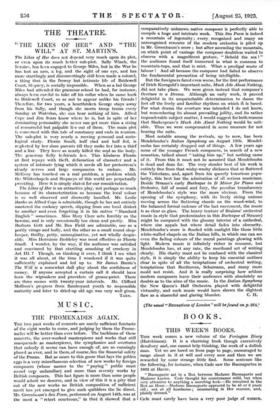THE THEATRE.
"THE LIKES OF HER" AND "THE WILL" AT Si'. MARTIN'S.
The Likes of Her does not depend very much upon its plot, or even upon its much better sub-plot. Sally Winch, the heroine, has been engaged to George Miles, but in the War he has lost an arm, a leg, and the sight of one eye, and has more startlingly and disconcertingly still been made a colonel, a thing that in the frowsy but intimate life of Bridewell Court, Stepney, is socially impossible. When as a lad George Miles had attended the grammar school he had, for instance, always been careful to take off his collar when he came back to Bridewell Court, so as not to appear unlike his friends ! Therefore, for two years, a heartbroken George stays away from his Sally, and though she meets troop trains every Sunday at Waterloo, she can hear nothing of him. Alfred Cope and Jim Sears know where he is, but in spite of her dominating personality she never can get more than a string of resourceful but palpable lies out of them. The main plot is concerned with this tale of constancy and ends in reunion. The sub-plot is very nearly a moving personal and socio- logical study. Florrie Small, half clad and half fed, is neglected by her slum parents till they make her into a thief and a liar. They have as nearly killed the soul as the body. The generous Sally befriends her. This kindness Florrie at first repays with theft, defamation of character and a system of intricate lying which it needs all her protectress's steady nerves and large compassion to endure. Mr. McEvoy has touched on a real problem, a problem which the Whitechapels and Stepneys of this world are perpetually providing. Here it is simply stated for our consideration.
The Likes of Her is an attractive play, not perhaps so much because of its characterization as because the local. colour is so well observed and discreetly handled. Mr. Leslie Banks as Alfred Cope is admirable, though he has not entirely mastered the cockney speech, slipping from one local dialect to another and even forgetting it in his native "Standard English" sometimes. Miss Mary Clare acts forcibly as the heroine, and is only occasionally too clean and pretty. Miss Barbara Gott and Mr. Ben Field are admirable, one as a portly virago and bully, and the other as a small round shop- keeper, thrifty, petty, unimaginative, yet not wholly despic- able. Miss Hermione Baddeley was most effective as Florrie Small. I wonder, by the way, if the audience was satisfied and convinced by that startling smashing of crockery in Act III.? Though, on thinking it over, I think I see what it was all about, at the time I wondered if it was quite sufficiently explained and led up to. Sir James Barrie's The Will is a somewhat dull play about the sordidness of money. If anyone accepted a curtain call it should have been the wigmakers and providers of grease-paint. There are three scenes with twenty-year intervals. Mr. Clifford Mollison's progress from flamboyant youth to responsible maturity and later to dried-up old age was very well given.
TARN.


































 Previous page
Previous page